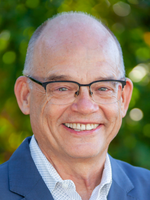Postdoctoral Fellowships
The Institute is currently recruiting for all fellowships. For more information, please contact Dr. Kristen Mark. To apply online, visit z.umn.edu/ISGH_Fellow.
Fellowships at ISGH
Doug Braun-Harvey Fellowship in Compulsive Sexual Behavior
The Doug Braun-Harvey Fellowship in Compulsive Sexual Behavior is a two-year program that provides training in the general area of sexual therapy with a particular emphasis in compulsive sexual behavior (CSB). This fellowship focuses on expanding access to care and advancing research to better understand, diagnose, and treat CSB.
The fellowship will support postdoctoral fellows who are interested in a career that combines clinical and scholarly endeavors in the area of CSB.
Fellows of the Institute for Sexual and Gender Health with an emphasis in compulsive sexual behavior spend 40% of their time conducting research projects under faculty supervision, with a goal of presenting results at a scientific conference or preparing an article for publication. They spend 60% of their time providing clinical care focused on CSB as well as treating a variety of sexual and gender health conditions, under the supervision of experienced professionals.
The goals for the fellowship program are to:
- Provide up-to-date training in the assessment and treatment of a variety of sexual and gender concerns;
- Provide more in-depth and up-to-date training in the assessment and treatment of compulsive sexual behavior;
- Provide education to medical students, family medicine residents on topics such as sex history taking, basic counseling skills for sexual and gender problems and concerns;
- Engage in scholarly activity (40% of your time) that advances skills in research design, analysis, report writing, and presentation in the area of compulsive sexual behavior.

About Doug Braun-Harvey
This fellowship is named for Doug Braun-Harvey, a sexual health psychotherapist who bridges sexual and mental health for men with out-of-control sexual behavior (OCSB). He is a national and international trainer who bridges principles of sexual health within drug and alcohol treatment, mental health care, group psychotherapy, HIV prevention and treatment, and child maltreatment. He is a Licensed Marriage and Family Therapist (MFT), Certified Group Psychotherapist (CGP) and Certified Sex Therapist (AASECT Certified). His private practice is in San Diego, California.
In 2013, Doug and his husband Albert Killen-Harvey co-founded The Harvey Institute, whose mission is to integrate sexual health conversations within health and human services. They have provided initial funding for the fellowship.
Past Fellows
Ryan Rahm-Knigge, PhD: 2020 - 2022
Itor Finotelli, PhD: 2019 - 2021
Janna Dickenson, PhD: 2017 - 2019
Michael E. Metz Fellowship in Couples' Sexual Health
The Michael E. Metz Fellowship in Couples' Sexual Health is a two-year program that provides training in the general area of sexual therapy with a particular emphasis in the area of relationship and couples' sexual health. This fellowship will focus on expanding access to care and advancing research to better understand, diagnose, and treat couples' sexual health concerns.
Fellows of the Institute for Sexual and Gender Health with an emphasis in couples' sexual health spend 40% of their time conducting research projects under faculty supervision, with a goal of presenting results at a scientific conference or preparing an article for publication. They spend 60% of their time providing clinical care focused on couples' sexual health as well as treating a variety of sexual and gender health conditions, under the supervision of experienced professionals. They will conduct research that will make a direct contribution to the field of couples’ sexual health.
The goals for the fellowship program are to:
- Provide up-to-date training in the assessment and treatment of a variety of sexual and gender concerns;
- Provide more in-depth and up-to-date training in the assessment and treatment of couples with sexual health concerns;
- Provide education to medical students, family medicine residents on topics such as sex history taking, basic counseling skills for sexual and gender problems and concerns;
- Engage in scholarly activity (40% of time) that advances skills in research design, analysis, report writing, and presentation in the area of couples' sexual health.

About Michael E. Metz
The Michael E. Metz Fellowship in Couples’ Sexual Health is created to honor the life and work of Michael E. Metz, PhD. Metz was a nationally respected psychologist and couples therapist, who for 12 years served on the faculty of the University of Minnesota Medical School and directed the Relationship and Sex Therapy program. As a clinician he worked with more than 6,000 couples, addressing and resolving relationship and sexual problems, improving their quality of life. He was a major spokesperson for a comprehensive, integrated "biopsychosocial" approach (attention to comprehensive medical, psychological, and interpersonal features) to addressing and resolving relationship conflict and sexual problems.
As a writer, he authored more than 60 professional articles and book chapters in the areas of couple intimacy, relationship conflict styles, sexual health, sexual medicine, and cognitive-behavioral features of satisfying relationships. He was the author of 4 books with Barry McCarthy: Enduring Desire, Men's Sexual Health, Coping With Erectile Dysfunction (ED), and Coping With Premature Ejaculation (PE). Coping With Erectile Dysfunction was awarded the 2007 SSTAR Best Consumer Sexual Health Book by the Society for Sex Therapy and Research as well as receiving the 2011 Self Help Book Seal of Merit Award from the Association for Behavioral and Cognitive Therapy. Enduring Desire was awarded the 2011 Best Book Award by the American Association of Sex Educators, Counselors, and Therapists.
He conceptualized the “Good Enough Sex Model” which was greeted with great appreciation. The model uses cognitive, behavioral, emotional, and relation factors to promote cohesion, cooperation, and intimacy.
Metz received many awards during his career. He was awarded the Minnesota Association for Marriage and Family Therapy’s Lifetime Distinguished Service Award, as well as two distinguished service awards from the Society for the Scientific Study of Sexuality. Most recently he was acknowledged for his lifetime contributions by the Society of Sex Therapy and Research.
The Michael E. Metz Fellowship in Couples’ Sexual Health has been made possible through a generous gift from his wife Hildy Bowbeer.
Past Fellows
Kat Arnella, PhD: 2020-2022
Nicholas Newstrom, PhD, LMFT: 2018-2020
Abby Girard, LMFT, PsyD: 2016-2018
Jennifer A. Vencill, PhD: 2014-2016
Randi and Fred Ettner Fellowship in Transgender Health
The Randi and Fred Ettner Fellowship in Transgender Health is a two-year program that provides training in the general area of sexual therapy, with a particular emphasis in the area of transgender and gender diverse health. This fellowship will focus on expanding access to care and advancing research to better understand, diagnose, and treat transgender and gender diverse health concerns.
The fellowship support postdoctoral fellows who are interested in a career that combines clinical and scholarly endeavors in the area of transgender health.
Fellows of the Institute for Sexual and GeNader Health with an emphasis in transgender health spend 40% of their time conducting research projects under faculty supervision, with a goal of presenting results at a scientific conference or preparing an article for publication. They spend 60% of their time providing clinical care focused on transgender health as well as treating a variety of sexual and gender health conditions, under the supervision of experienced professionals.
The goals for the fellowship program are to:
- Provide up-to-date training in the assessment and treatment of a variety of sexual and gender concerns;
- Provide more in-depth and up-to-date training in the assessment and treatment of gender identity concerns;
- Provide education to medical students, family medicine residents on topics such as sex history taking, basic counseling skills for sexual and gender problems and concerns;
- Engage in scholarly activity (40% of your time) that advances skills in research design, analysis, report writing, and presentation in the area of transgender health.

About Randi and Fred Ettner
Dr. Randi Ettner is a clinical and forensic psychologist whose practice is located in Evanston, IL. She is a leader in the field of transgender health, an expert witness in Medicare, anti-discrimination laws, parental rights and health care for prisoners. She is a board member for WPATH and chairs their committee for incarcerated persons. Dr. Ettner conducts research and is the author of four books, including a medical and surgical text. She is the president of New Health Foundation Worldwide. She received her Ph.D. in psychology at Northwestern University.
Dr. Frederic M. Ettner MD is a family physician with 36 years of experience including 20 years treating transgender youth and adults. In addition to his practice, he conducts research and teaches medical students. His practice is located in Lincolnwood, IL. Dr. Ettner received his M.D. from The Chicago Medical School at Rosalind Franklin University of Medicine and Science.
They have provided initial funding for this fellowship.

Current Fellow
Ben Parchem, PhD is the current Randi and Fred Ettner Fellow in Transgender Health. Dr. Parchem earned his doctorate in clinical psychology from George Washington University, with an emphasis on cultural humility and community-driven approaches. He completed clinical externships at Children’s National in integrated primary care, HIV mental health services, and the gender and autism program. He completed his predoctoral clinical internship at Phoenix Children’s Hospital in pediatric psychology working with various pediatric populations, and in the Gender Support Program. Over the course of his doctoral training, Dr. Parchem’s research has focused on the sexual, physical, and mental health of sexual and gender minorities. In his postdoctoral training at the Institute for Sexual and Gender Health, Dr. Parchem will provide assessment and therapy services to gender diverse children, adolescents, and young adults and contribute to research projects aiming to ameliorate health disparities and promote wellbeing among LGBTQ+ youth, particularly youth of color.
Past Fellows
Taymy Caso, PhD: 2020-2022
Ghazel Tellawi, PhD: 2018 - 2020
Nic Rider, PhD: 2016 - 2018
The sexual and gender health fellowships at the University of Minnesota provide two years of training in sex and gender-related therapy and research. There are three fellowships at ISGH, each with a different area of specialty: one in couples' sexual health, one in transgender health, and one in compulsive sexual behavior (CSB). The fellowships are designed to support a balanced mix of clinical and research training in one of the three specialty areas. The clinic serves a diverse group of patients (an average of 1,200 visits per month), including children, adolescents, sex and gender minorities, disabled individuals, and clients with chronic medical or mental health concerns.
The training will help fellows develop skills in addressing sexual issues in any clinical setting. In addition to sex therapy, treatment addresses a wide variety of psychiatric disorders. Fellows complete a research project that is tailored to specific interests. The fellowships meet the post-doctoral supervision licensure requirements for accreditation as a sex therapist by the American Association for Sex Educators, Counselors and Therapists (AASECT).
Fellows can expect a rigorous clinical, research, and supervision training experience by:
- Providing 16 hours per week of direct individual, family, or group therapy (with additional clinical time devoted to case management and documentation) depending upon the specific fellowship and the amount of time that can be devoted to research. In addition, the clinical experience and supervision meets requirements for licensure in the State of Minnesota or other states.
- Working effectively in an inter-professional team (faculty psychologists, psychiatry physician assistant, nurse practitioner, family physician, support staff).
- Providing education to medical students and family medicine residents on topics such as sex history taking, basic counseling skills for sexual concerns and problems.
- Engaging in scholarly activity that advances the field of sex and gender therapy and research
Applicants must have a PhD or PsyD in psychology or marriage and family therapy and be eligible for licensure in the State of Minnesota. We prefer applicants to have experience or an interest in a career that combines clinical and scholarly endeavors in the area of sexual and gender health. Our fellows enjoy a competitive salary, excellent benefits, and a professional travel stipend. The University of Minnesota recognizes and values the importance of diversity and inclusion in enriching the employment experience of its employees and in supporting the academic mission, and is proud to be an Equal Opportunity Employer.
The fellowship is a member of the Association of Psychology Postdoctoral and Internship Centers (APPIC).
More Information
SUPERVISION
Fellows receive a minimum of three hours per week of clinical supervision:
- Two hours of individual face-to-face supervision
- Supervisors are responsible for all cases (reviewing and countersigning all clinical assessments, notes, treatment plans, case summaries)
- One hour of group supervision per week, rotating among the primary fellowship supervisors and Training Director
In addition, fellows receive additional supervision as follows:
- One-to-two (1-2) hours of face-to-face individual research supervision per month with research supervisor
- One hour a month to meet with each other for peer supervision
- Meet with the Training Director face-to-face a minimum of two times a year for overall evaluation, monitoring progress, career development, and supervision
- Ongoing supervision/consultation provided by clinical supervisors as needed
- Supervisors available on-site
EVALUATION
Fellows are evaluated at six, 12, and 18 months and at the end of their fellowship (two times a year). Evaluations are conducted in a face-to-face meeting with the fellow's supervisors. Evaluations provide fellows the opportunity to give and receive feedback about how the fellowship is going.
Evaluation methods are given to them at the beginning of their fellowship. If fellows do not meet required levels of competency on fellow evaluations, the due process guidelines may be initiated.
DUE PROCESS & GRIEVANCE PROCEDURES
Fellows are informed at the beginning of their fellowship about due process and grievance procedures. Information is given to them as well as made available on the Google Drive related to all of their training activities.